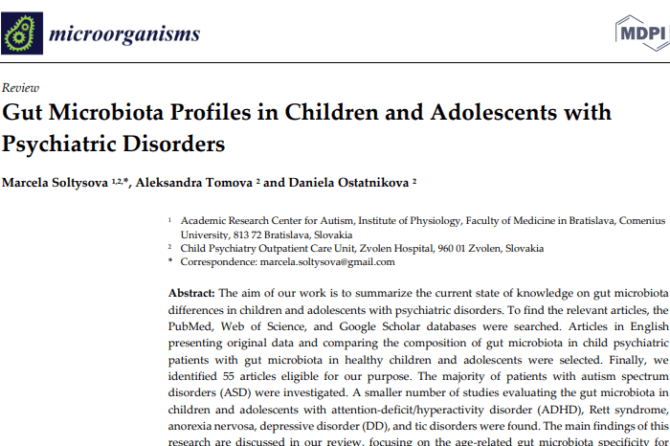
AUTHORS: Soltysova, M., Tomova, A., Ostatnikova, D.
ABSTRACT: The aim of our work is to summarize the current state of knowledge on gut microbiota differences in children and adolescents with psychiatric disorders. To find the relevant articles, the PubMed, Web of Science, and Google Scholar databases were searched. Articles in English presenting original data and comparing the composition of gut microbiota in child psychiatric patients with gut microbiota in healthy children and adolescents were selected. Finally, we identified 55 articles eligible for our purpose. The majority of patients with autism spectrum disorders (ASD) were investigated. A smaller number of studies evaluating the gut microbiota in children and adolescents with attention-deficit/hyperactivity disorder (ADHD), Rett syndrome, anorexia nervosa, depressive disorder (DD), and tic disorders were found. The main findings of this research are discussed in our review, focusing on the age-related gut microbiota specificity for psychiatric disorders and the differences between individual diagnosis. To conclude, the gut microbiota in children and adolescents with psychiatric disorders is evidently different from that in controls. The most pronounced differences are seen in children with ASD, less in ADHD. Moreover, the changes are not identical to those in adult psychiatric patients, as Ruminococcus, Turicibacter, and Bilophila were increased in adults, and decreased in children with ASD, and Parabacteroides and Alistipes were more frequently represented in adults, but less frequently represented in children with depression. The available data suggest some genera have a different abundance in individual psychiatric disorders (e.g., Bilophila, Bifidobacterium, Clostridium, Coprococcus, Faecalibacterium, and Ruminococcus), suggesting their importance for the gut–brain axis. Other bacterial genera might be more important for the pathophysiology of specific disorder in children and adolescents, as Akkermansia and Desulfovibrio for ASD, or Romboutsia for DD. Based on the research findings, we assume that gut microbiota corrections have the potential to improve clinical symptoms in psychiatric patients.
Microorganisms 2022, 10, 2009.


